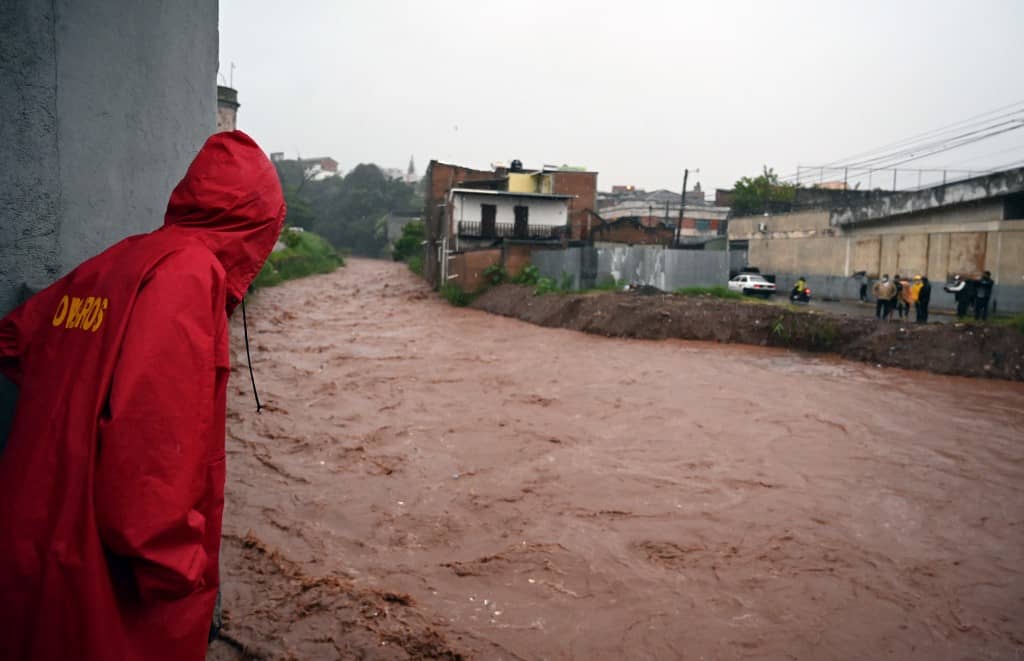Iota arrived in Honduras on Tuesday as a tropical storm after leaving eight dead and causing extensive damage in Nicaragua, where thousands of people were cut off from water or electricity. The storm threatens to aggravate the situation in areas of Central America devastated two weeks ago by Hurricane Eta.
The latest cyclone left six dead in Nicaragua — two of them children — as well as one in Panama and another on the Colombian island of Providencia.
The head of meteorology of Honduran civil protection (Copeco), Francisco Argeñal, told AFP that Iota entered Honduras through the eastern department of El Paraíso and passed 55 km south of Tegucigalpa.
Argeñal predicted that the storm, which is advancing at 19 kmh with sustained winds of 80 kmh, will reach El Salvador early Wednesday morning.
The Honduran government ordered the closure of the country’s main highways until Wednesday morning due to the risk of rivers overflowing.
Iota, which made landfall Monday night as a Category 5 hurricane (the highest on the Saffir-Simpson scale), was downgraded to a tropical storm on Tuesday.
Stronger than Eta, Iota reached Nicaragua as a hurricane with maximum winds of 260 kmh, according to a report from the United States National Hurricane Center (NHC).
Flash floods and river floods that threaten the lives of residents are expected to continue until Thursday in parts of Central America due to rains caused by Iota, the NHC warned.
And in Honduras, Nicaragua and Guatemala these phenomena “could be exacerbated by the recent effects of Hurricane Eta,” which also made landfall in the Nicaraguan Caribbean on November 3 and left at least 200 dead and 2.5 million affected throughout Central America.
In Bilwi, the main city in the North Caribbean of Nicaragua, there are “falling trees, electricity poles, roofs of houses that were blown up in the air and a hotel that lost its entire roof,” said the director of the National System of Prevention, Mitigation and Attention of Disasters (Sinapred), Guillermo González.
Two children died on Monday in Nicaragua while trying to cross a river, and four other people died in different parts of the country in floods and landslides, reported the country’s vice president, Rosario Murillo.
Communities without communication
Nicaraguan Infrastructure Minister Denis Moncada said brigades are trying to clear 497 trees that fell on highways in the Caribbean municipalities of Rosita, Siuna and Bonanza.
He indicated that on the Pacific coast, there are roadblocks, mainly in the southern department of Rivas, on the Pan-American highway, due to the overflow of the Ochomogo River.
Sinapred reported that 48,000 people were evacuated in Nicaragua, the majority in the North Caribbean.
But the real extent of the damage caused by Iota in the area is unknown as communication with Bilwi has been disrupted.
The Nicaraguan state telecommunications company, Telcor, reported in a press release that there are “serious effects” on communications in that town.
The Nicaraguan government reported that 114,200 homes across the country were left without electricity and 47,638 without water.
Sinapred also warned of potential landslides due to heavy rains in other locations in Nicaragua.
Threat throughout the region
As Iota approached Honduras, military and police evacuated residents from at-risk areas in the Sula valley region and from riverbanks and landslide-prone neighborhoods in Tegucigalpa.
In the Miskito community of Nueva Jerusalem, in the Caribbean, winds destroyed the roof of the health center and 38 houses, according to a report by Copeco.
On Monday, at least one person died on the Colombian island of Providencia, where Iota destroyed about 98% of infrastructure, according to President Iván Duque on Twitter.
Panamanian authorities, meanwhile, reported a deceased woman in the Ngäbe Buglé indigenous region, while some 2,000 people were sheltered, although the rains were decreasing in that country.
Iota was also felt in Costa Rica, which reported 16 floods, mostly on the Pacific coast, and five landslides that blocked routes, according to the National Emergency Commission.
Guatemala was preparing for “the worst,” said President Alejandro Giammattei, although the damage has been less than expected.
The current hurricane season in the Atlantic has broken records. Iota is the 13th of 30 named storms recorded this year to reach hurricane status.






